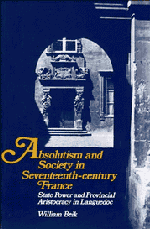 Absolutism and Society in Seventeenth-Century France
Absolutism and Society in Seventeenth-Century France Published online by Cambridge University Press: 05 July 2011
To what extent did the rulers of Languedoc share a common ideological perspective? Viewing the course of political events from their various geographical and institutional vantage points, what did they desire of the king, his government, their society, and what were they afraid of? Information on their attitudes is available in abundance in speeches, letters, and reports, and though most of it is of a highly public nature unlikely to reveal secret antagonisms or seditious inclinations, these stated intentions are nevertheless a good indication of the parameters of their world-view. This diverse body of material reveals both common aspirations and divergences of interest.
COMMON VALUES
The rulers of Languedoc started out with a common frame of reference derived from their social environment. Most of them enjoyed great wealth, belonging to a world of town houses and country estates within which their lives were lived according to familiar patterns of aristocratic courtesy: exchanges of visits and compliments, periodic changes of residence, attendance by ‘courts’ of servants and followers. All were literate, and all spoke and wrote in French, though one suspects that those of local origin were not free from manners that would have struck Parisians as decidedly meridional. More important, all had some access to a humanist–theological education which offered a common frame of reference for discussion of power and morality, though their facility in using it ranged from certain country nobles' smattering of learning to the vast erudition of some prelates and jurists.
To save this book to your Kindle, first ensure [email protected] is added to your Approved Personal Document E-mail List under your Personal Document Settings on the Manage Your Content and Devices page of your Amazon account. Then enter the ‘name’ part of your Kindle email address below. Find out more about saving to your Kindle.
Note you can select to save to either the @free.kindle.com or @kindle.com variations. ‘@free.kindle.com’ emails are free but can only be saved to your device when it is connected to wi-fi. ‘@kindle.com’ emails can be delivered even when you are not connected to wi-fi, but note that service fees apply.
Find out more about the Kindle Personal Document Service.
To save content items to your account, please confirm that you agree to abide by our usage policies. If this is the first time you use this feature, you will be asked to authorise Cambridge Core to connect with your account. Find out more about saving content to Dropbox.
To save content items to your account, please confirm that you agree to abide by our usage policies. If this is the first time you use this feature, you will be asked to authorise Cambridge Core to connect with your account. Find out more about saving content to Google Drive.